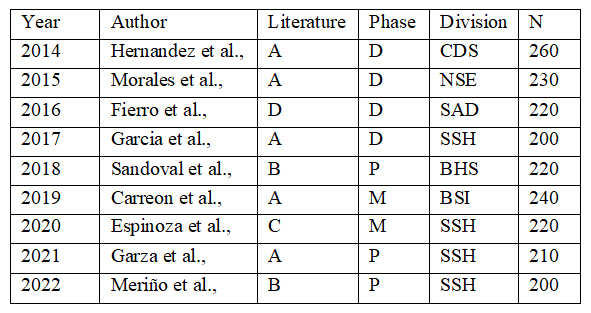Intellectual capital in the COVID-19 era
Abstract
In social sciences, the meta-analytical fixed effects models have gained special relevance due to their predictive capacity of a scenario, context and process, although they have focused on the estimation and prediction of simple variables, avoiding the effects of diffuse variables such as those emerging in processes Training and research. The objective of this work was to establish fixed effects models to explain the influence of diffuse variables in the formation of intellectual capital, considering contextual, educational, academic and professional variables. A retrospective study was conducted with literature from 2019 to 2022, as well as an exploratory study with variables that have been conceptualized, but not empirically tested and correlational with an intentional selection of six studies that used diffuse variables to explain attrition. The results show that the model with the greatest adjustment is the one where the emergence of anti-plagiarism software and new editorial provisions explain the dropout, although the research design limited the results to the study scenario, suggesting its extension and sophistication with other statistical techniques.
Keywords:
- Capital, intellectual, formation, diffuse, model
References
Basyith, A. (2016). Corporate governance, intellectual capital and form performance. Research in Applied Economy, 8 (1), 17-41
Budsankon, P. Sawangboon, T., Damrongpanit, S. & Chuesirimingkoi, J. (2015). Factors affecting higher order thinking skills of student: A meta-analitic structural equation modelling study. Educational Research & Review, 10 (9), 2039-2652
Bustos Aguayo, J., López Nava Tapia, S., & García Lirios, C. (2019). Discursos de la formación investigativa del capital intelectual en ciencias de la salud. Revista De PsicologíA De La Universidad AutóNoma Del Estado De MéXico, 8(16), 8- 23. doi:10.36677/rpsicologia.v8i16.14931
Carreon, J., Espinoza, F. & Garcia, C. (2019). Categorial exploratory structure of intellectual capital formation in its phase of intangible organizational assets. Journal Social Science Research, 6 (8), 1-6
Carreon, J., Hernández, T. J., & Garcia, C. (2019). Exploratory categorical structure of employment expectations. Journal Social Science Research, 6 (8), 1-6
Elizarraraz, G. (2020). Meta-analytical validity of the technology utility perception scale. International Journal Psychiatry Research, 3 (8), 1-7
Espinoza, F. (2020). Scenarios, phases, roles and discourses of Internet violence in a higher education institution. Disciplinary Journal Economics & Social Science, 2 (1), 1-20
García Lirios, C. (2019a). Exploratory dimensions of the attitude toward occupational health. Dimensión Empresarial, 17(3). https://doi.org/10.15665/dem.v17i3.1924
García Lirios, C. (2019b). Inteligencias y sabidurías organizacionales: Redes de conocimiento en torno al aprendizaje de la complejidad: Inteligencias y sabidurías organizacionales: Redes de conocimiento en torno al aprendizaje de la complejidad. Psicogente, 22(41), 1-28. https://doi.org/10.17081/psico.22.41.3304
Garcia, C. (2020). Reliability and validity of an instrument that measures corporate social responsibility. Social Science & Humanities Journal, 4 (2), 1781-1789
García-Lirios, C. (2021a). Redes tutoriales en la elaboración del protocolo de investigación. Comunicación, Cultura Y Política, 12. https://doi.org/10.21158/21451494.v12.2021.3083
García Lirios, C. (2021b). Percepciones de riesgo laborales en la era Post Covid-19. KNOW AND SHARE PSYCHOLOGY, 2(1). https://doi.org/10.25115/kasp.v2i1.3869
García Lirios, C., Garza Sánchez, J., Hernández Gracia, T., Carreón Guillén, J., & Espinoza Morales, F. (2021). Contraste de un modelo de los determinantes de la estancia turística en la era covid-19: implicaciones para la bioseguridad. Turismo Y Patrimonio, (16), 11-20. https://doi.org/10.24265/turpatrim.2021.n16.01
Molina, H. D., Martinez, E. & Garcia, C. (2019). Structure based of the exploration of a perceptual risk algorithm. International Journal Science, 9 (6), 1-10
Payborji, J. & Haghighi, K. (2016). The impact of intellectual capital on business performance. Business, Management and Strategy, 7 (2), 157-177
Sánchez, A., García, C., García, J. J., Juárez, M., Molina, H. D., Amemiya, M. & Martinez, E. (2019). Effects of corporate policies on the quality of technological life. International Journal of Innovate Technology an Exploring Engineering, 10 (10), 1-14
Sánchez, A., Sánchez, R., Bermudez, G. & Garcia, C. (2019). Specification of a model for the study of management culture. Espirales, 3 (30), 1-11
-
Article Viewed: 0
Total Download
##plugins.themes.ojsPlusA.frontend.article.downloadstatastics##



